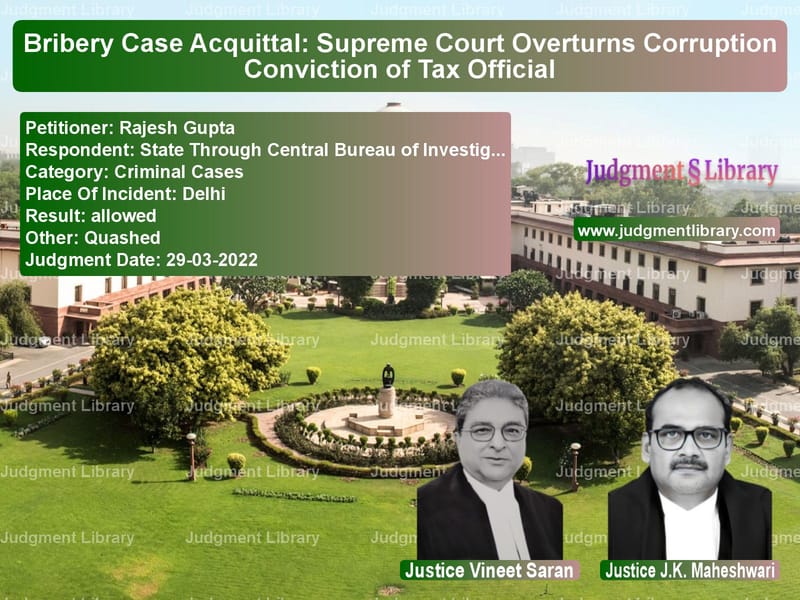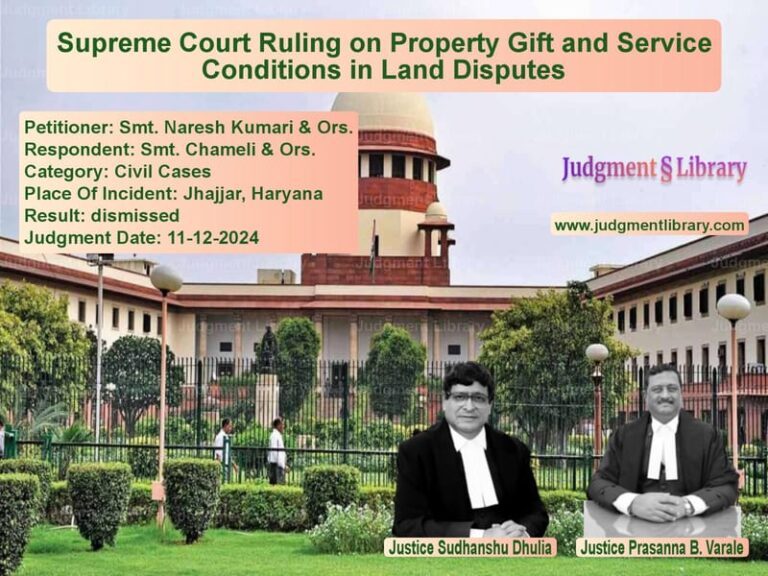Bribery Case Acquittal: Supreme Court Overturns Corruption Conviction of Tax Official
The case of Rajesh Gupta vs. State Through Central Bureau of Investigation revolves around allegations of corruption against a tax official. The case was initiated under the Prevention of Corruption Act, 1988, wherein Rajesh Gupta, an Assistant Commissioner of Income Tax, was convicted for allegedly demanding and accepting a bribe. However, the Supreme Court overturned the conviction, citing insufficient evidence and procedural lapses.
This judgment serves as a crucial precedent in corruption cases, particularly emphasizing the necessity of proving demand and acceptance beyond reasonable doubt.
Background of the Case
Rajesh Gupta was accused of demanding and accepting a bribe of Rs. 15,000 from a complainant, Madhu Bala, in exchange for favorable scrutiny of her tax case. Based on her complaint, a trap was set by the Central Bureau of Investigation (CBI), which led to Gupta’s arrest.
The Trial Court, in its judgment dated January 24, 2009, convicted Gupta under Sections 7 and 13(2) read with Section 13(1)(d) of the Prevention of Corruption Act. He was sentenced to:
- Two years rigorous imprisonment and a fine of Rs. 15,000 under Section 7 of the PC Act.
- Two and a half years rigorous imprisonment and a fine of Rs. 15,000 under Section 13(2) read with Section 13(1)(d).
Both sentences were directed to run concurrently.
Gupta appealed against the conviction before the Delhi High Court, which upheld the Trial Court’s judgment on March 25, 2014. Dissatisfied, he moved the Supreme Court, challenging the validity of the findings.
Arguments of the Petitioner (Rajesh Gupta)
The defense, led by Senior Advocate V. Giri, argued:
- The prosecution failed to prove the essential elements of bribery—namely, demand, acceptance, and recovery.
- The evidence presented was unreliable and contradictory, particularly the audio recordings of the alleged demand.
- The shadow witnesses failed to corroborate the prosecution’s claims.
- The money was not recovered from Gupta’s person but was found on the visitor’s side of his office table.
- The High Court and Trial Court erroneously relied on presumption under Section 20 of the PC Act without concrete proof of demand.
Arguments of the Respondent (CBI)
The CBI countered:
- The complainant, Madhu Bala, had provided credible testimony regarding the demand and acceptance of the bribe.
- Phenolphthalein powder was found on the seized notes, confirming that the tainted money was present in Gupta’s office.
- Despite audio quality issues, the transcripts indicated incriminating conversations.
- The Trial Court had rightly relied on circumstantial evidence to infer the guilt of the accused.
Supreme Court’s Observations
The Supreme Court, comprising Justices Vineet Saran and J.K. Maheshwari, closely examined the prosecution’s case and found significant gaps in evidence.
Key observations included:
- Failure to Prove Demand: The complainant’s testimony lacked corroboration, and the audio recordings were deemed inaudible and unreliable.
- Shadow Witnesses Did Not Support Prosecution: Neither of the shadow witnesses confirmed that the accused demanded the bribe.
- No Direct Acceptance Evidence: The tainted money was not recovered from Gupta’s hands but was found on the visitor’s side of the office table.
- Incorrect Application of Presumption: Presumption under Section 20 of the PC Act could not be invoked without clear proof of demand and acceptance.
The Court remarked:
“The presumption under Section 20 of the PC Act can be drawn only after demand and acceptance of illegal gratification is proved beyond reasonable doubt.”
Supreme Court’s Verdict
On March 29, 2022, the Supreme Court ruled:
- The findings of the Trial Court and High Court were based on conjecture and not supported by reliable evidence.
- The prosecution failed to establish demand and acceptance, both essential ingredients for conviction under the PC Act.
- The conviction and sentence were set aside, and Rajesh Gupta was honorably acquitted.
The Court concluded:
“There is no proof of demand at pre-trap stage or during trap. The Courts must not overlook the fundamental principle of presumption of innocence until guilt is established beyond reasonable doubt.”
Conclusion
This judgment reaffirms key principles in corruption law:
- Demand and acceptance must be proven: Mere recovery of bribe money does not establish guilt.
- Shadow witnesses play a crucial role: Their testimony must support the prosecution’s case.
- Presumption under Section 20 of the PC Act is not automatic: It can only be invoked when demand is conclusively proven.
- Defendants must be given the benefit of doubt: If evidence is insufficient, courts must rule in favor of the accused.
The Supreme Court’s decision highlights the necessity of solid evidence in bribery cases and protects individuals from wrongful convictions.
Petitioner Name: Rajesh Gupta.Respondent Name: State Through Central Bureau of Investigation.Judgment By: Justice Vineet Saran, Justice J.K. Maheshwari.Place Of Incident: Delhi.Judgment Date: 29-03-2022.
Don’t miss out on the full details! Download the complete judgment in PDF format below and gain valuable insights instantly!
Download Judgment: rajesh-gupta-vs-state-through-centra-supreme-court-of-india-judgment-dated-29-03-2022.pdf
Directly Download Judgment: Directly download this Judgment
See all petitions in Money Laundering Cases
See all petitions in Fraud and Forgery
See all petitions in Bail and Anticipatory Bail
See all petitions in Judgment by Vineet Saran
See all petitions in Judgment by J.K. Maheshwari
See all petitions in allowed
See all petitions in Quashed
See all petitions in supreme court of India judgments March 2022
See all petitions in 2022 judgments
See all posts in Criminal Cases Category
See all allowed petitions in Criminal Cases Category
See all Dismissed petitions in Criminal Cases Category
See all partially allowed petitions in Criminal Cases Category







